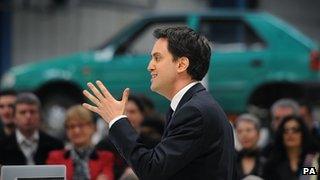Analysis: Why Miliband has chosen 10p tax as his first real policy commitment
- Published

The tax announcements arise from a debate about Labour's message on the economy
Bedford might not be your first stop on a political tour of Britain, but on Thursday Ed Miliband tried to put it on the map.
More than half a century ago, the Conservative Prime Minister, Harold Macmillan, visited the town and uttered that famous phrase "most of our people have never had it so good".
The Labour leader has provided his own twist on that phrase, saying: "Far from feeling they have never had it so good, millions across Britain today fear they will never have it so good again."
His argument is a complex one about how to create growth from the middle, rather than, as he puts it, relying on a trickle-down from the top - his characterisation of the coalition's approach.
But the really eye-catching thing about Mr Miliband's trip to Bedford is that it marks his first real policy commitment for a future Labour government.
Up until now, most Labour policy has been based on what it would do right now in the current circumstances, such as a temporary cut in VAT or not reducing the top rate of income tax from 50p to 45p.
Manifesto line
When pressed whether those measures would be implemented in government, it has always rebutted the question, saying no sensible opposition party writes its manifesto this far from an election.
But the proposal for a property tax on houses worth more than £2m to fund the reintroduction of a 10p income tax band is what the party wants to do in government.
So it goes in the manifesto you might think. But not quite.
Labour is sticking to the line that it will not write any part of that manifesto this far out from an election. That of course poses a small logical problem: it's what we want to do in government, but we won't say it will be in the manifesto.
There are two good political reasons for Labour sticking to this slightly tricky argument.
Firstly, announcing policies too early can allow your opponents simply to nick them for themselves. And secondly, even if they don't do that, you give your opponents a long period of time to pick away at the policy until it hangs in shreds, way ahead of election time.
So why has Labour opted to be more specific now and to begin talking about living standards?
The first point to note is despite substantial leads in the polls that look at voting intention, Labour has not managed to nose ahead of the government when it comes to questions of economic management.
Any sensible party would, in those circumstances, look at the message it was delivering on the economy and change it.
Ronald Reagan question
Second there has been a debate within the party over how the economic message is framed.
Do voters really connect with the more abstract debates over growth and double/triple dip recessions?
Some argue that you do much better to shift the discussion from the macro to the micro - and ask people that now famous Ronald Reagan question: are you better off than you were four years ago?
That was a question that managed to turn a neck-and-neck election in 1980 into a thumping victory for the Republicans.
The third key point here is that proposing a mansion tax is sensible political positioning.
The Liberal Democrats have championed this policy for several years but they have not managed to get it past their Conservative coalition partners. If coalition politics is here to stay then this could provide some important common ground if Labour found itself the largest party after the election but without an overall majority.
And also, reintroducing the 10p rate allows Ed Miliband to say that its scrapping by Gordon Brown in 2008 was a "big mistake", giving him the chance to tell voters that he wants to be seen as a break with the past.
Armour-plated?
The downside of being specific of course is that people will then start asking you to be specific on everything; refusing to do so can end up looking evasive or, worse, lacking in ideas.
In interviews today, most notably on the BBC's Daily Politics, Labour has already had some difficulty explaining to do about just how it would go about establishing who pays a new mansion tax.
Labour has done its best to armour-plate the policy.
Lib Dems can't attack it, because they agree with the idea of a mansion tax, and in saying that the width of the new band will be determined by the amount of tax raised, Labour can present the policy as pure distribution and fiscally neutral.
In truth the plan will mean an extra £2 a week for basic rate tax payers - not a fortune you might think.
But in this case, the message is at least as important as the cash.
- Published14 February 2013